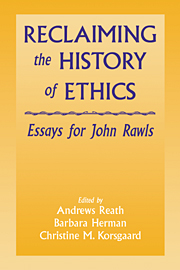Book contents
- Frontmatter
- Contents
- List of Contributors
- Introduction
- Aristotle on the Soul's Conflicts: Toward an Understanding of Virtue Ethics
- Coercion, Ideology, and Education in Hobbes's Leviathan
- The Hobbesian Side of Hume
- The Natural Goodness of Humanity
- Metaphysics, Philosophy: Rousseau on the Problem of Evil
- Within the Limits of Reason
- A Cosmopolitan Kingdom of Ends
- Legislating for a Realm of Ends: The Social Dimension of Autonomy
- Kant on the Objectivity of the Moral Law
- Kantian Virtue: Priggish or Passional?
- Taking the Law into Our Own Hands: Kant on the Right to Revolution
- Kant on Aesthetic and Biological Purposiveness
- Kant on Ends and the Meaning of Life
- Community and Completion
The Natural Goodness of Humanity
Published online by Cambridge University Press: 04 November 2009
- Frontmatter
- Contents
- List of Contributors
- Introduction
- Aristotle on the Soul's Conflicts: Toward an Understanding of Virtue Ethics
- Coercion, Ideology, and Education in Hobbes's Leviathan
- The Hobbesian Side of Hume
- The Natural Goodness of Humanity
- Metaphysics, Philosophy: Rousseau on the Problem of Evil
- Within the Limits of Reason
- A Cosmopolitan Kingdom of Ends
- Legislating for a Realm of Ends: The Social Dimension of Autonomy
- Kant on the Objectivity of the Moral Law
- Kantian Virtue: Priggish or Passional?
- Taking the Law into Our Own Hands: Kant on the Right to Revolution
- Kant on Aesthetic and Biological Purposiveness
- Kant on Ends and the Meaning of Life
- Community and Completion
Summary
Men are wicked; a sad and constant experience makes proof unnecessary.
Jean-Jacques RousseauDespite the depressing sight, not so much of ills that oppress mankind from natural causes as of those men inflict upon each other, the mind is cheered by the prospect that things may be better in future.… Empirical arguments against the success of these resolves, which rest on hope, are insufficient here. The argument that what has not succeeded so far never will succeed, does not even justify the abandonment of a pragmatic or technological intention… much less than abandonment of a moral intention that becomes a duty unless its accomplishment is demonstrably impossible.
Immanuel KantLet us … begin by setting aside all the facts, for they do not affect the question.
Jean-Jacques RousseauIntroduction
As Rousseau tells the story, he was walking along the road from Paris to Vincennes in 1749 (on his way to visit Diderot, then imprisoned in the château of Vincennes), contemplating a question from the Academy of Dijon – “Has the restoration of the sciences and the arts helped to purify morals?” – when he was overtaken by a flood of ideas, “a thousand lights.” Lying at the heart of this “sudden inspiration” was the thought that dominated his subsequent writing: “that man is naturally good, and that it is solely by [our] institutions that men become wicked” (M, 1136).
The conception of natural human goodness is not uniquely Rousseau's. Egalitarian and radical democratic political views commonly hold that human motivations supporting unjust institutions are not intrinsic to our nature, but explained by those institutions themselves.
- Type
- Chapter
- Information
- Reclaiming the History of EthicsEssays for John Rawls, pp. 102 - 139Publisher: Cambridge University PressPrint publication year: 1997
- 4
- Cited by



